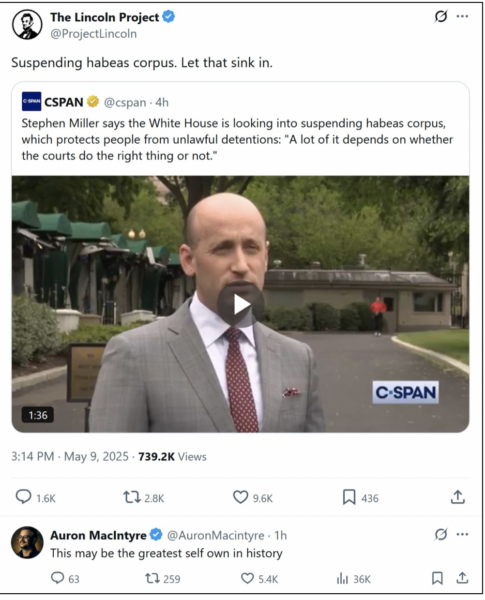White House counselor Stephen Miller touched off a firestorm by suggesting that the administration is looking into suspending the writ of habeas corpus as to illegal aliens in custody. Liberals, naturally, have responded with horror:
The joke here is that the Lincoln Project seems unaware that Lincoln suspended habeas corpus during the Civil War.
Seriously, though: can the administration suspend habeas corpus as to those detainees? And should it?
This is what Article I, Section 9 says on the subject:
The Privilege of the Writ of Habeas Corpus shall not be suspended, unless when in Cases of Rebellion or Invasion the public Safety may require it.
I think most legal analysts believe that Lincoln’s suspension of the writ during the Civil War was unconstitutional, notwithstanding that a rebellion was undeniably in progress. There is no doubt that the writ can be suspended; the question is, by whom? Many commentators argue that only Congress can suspend the writ, since the above provision is in Article I, which deals generally with the powers of Congress, not Article II, which addresses the powers of the president.
That is a cogent argument, but in fact, not all of Article 1 is directed toward Congress. Section 10 of Article 1 deals generally with the federal system, and is not specifically directed at Congress. And the last four paragraphs of Section 9, the section that provides for suspension of habeas corpus, are not uniquely addressed to Congress, but rather apply also to some combination of the executive branch and the states. So the Article I argument is not conclusive.
Today, of course, we have the added question of whether an invasion is in progress. The Trump administration characterizes the influx of 10 million or more illegals across our Southern border as an invasion, and has predicated one or more executive orders on that position. Again, this is debatable, but I think the administration’s position is not unreasonable.
So a case can be made that suspension of habeas corpus by the President, under present circumstances, is constitutional. The Lincoln precedent, too, weighs in Trump’s favor. How the Supreme Court would decide the issue, if it comes to that, no one can say. (Or rather, we can say as always: three votes, those of the Democrats, are not in doubt. They will vote in lockstep as they always do in political cases. What is in doubt is how the other justices might vote.) But I think the administration probably would lose.
The second question is whether the administration should suspend the writ. Politically, I think it would be a bad mistake. It would play to the Democrats’ characterization of the administration as lawless–an accusation that until now is entirely false, but would be made colorable by suspension of the writ. And the district court judges before whom cases would come, all Democrats because of the Democrats’ judge-shopping, would issue orders ignoring the administration’s action, accompanied by blistering opinions denouncing the administration’s suspension as unconstitutional.
On the other hand, I think it makes sense for the administration to threaten to suspend habeas corpus, as it now has done. Rogue Democratic Party judges have carried out a disgraceful campaign to frustrate the will of the voters by issuing orders that are ill-founded, legally unwarranted and overbroad. It is up to the Supreme Court to rein in this judicial misconduct.
But the Republican-appointed justices, with the exceptions of Clarence Thomas and Sam Alito, are timid. It is not clear that they will be motivated to do the right thing, in the face of condemnation from liberals, i.e., pretty much all the people they hear from in Washington. But what John Roberts and his colleagues want to avoid more than anything is a full-blown constitutional crisis of the sort that could be precipitated if President Trump goes ahead with suspending habeas corpus. So the threat of a suspension may motivate them to do the right thing as cases arising from the existing state of affairs come before them.
Thus, in my opinion, the administration’s best course of action is to threaten to suspend habeas corpus, but not to do it.














